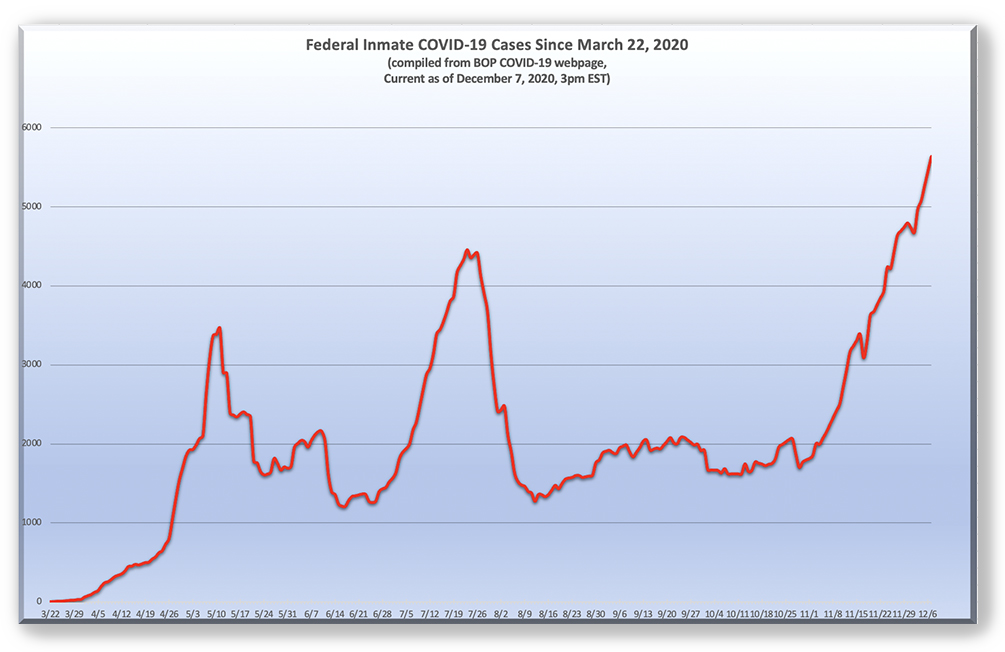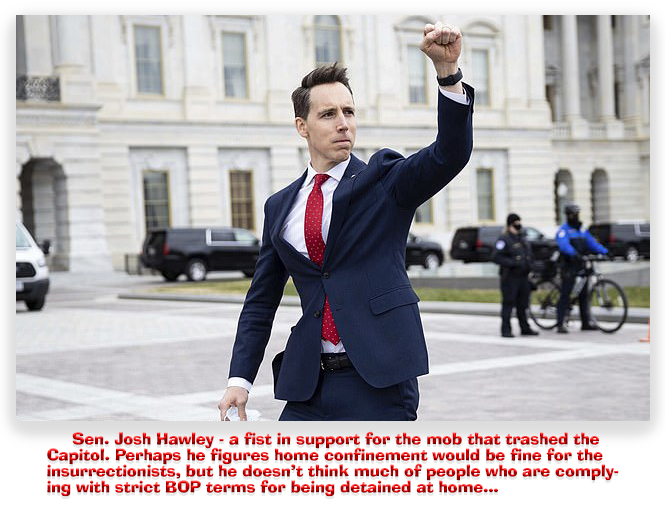We post news and comment on federal criminal justice issues, focused primarily on trial and post-conviction matters, legislative initiatives, and sentencing issues.

BOP COVID CASES BREAKS 5,000 AS LEGISLATORS GRILL CARVAJAL
 BOP inmate COVID-19 cases passed a grim milestone last Friday, rocketing past the 5,000 mark. That number jumped another 10% over the weekend. As of last night, the BOP had ended with
BOP inmate COVID-19 cases passed a grim milestone last Friday, rocketing past the 5,000 mark. That number jumped another 10% over the weekend. As of last night, the BOP had ended with
• 5,634 ill inmates (up 15% from the week before);
• 1,613 sick staff (up 12% from last week);
• COVID in 128 BOP facilities; and
• 163 dead inmates.
The BOP has tested 57% of all inmates at least once, with the positivity rate climbing from 25% – where it has hovered for months – to over 32%.
To put this in perspective, one out of every five federal inmates who has ever had the virus has it right now.

Two BOP facilities have more than 300 sick inmates, Loretto and Texarkana, three more with over 200 ill, andand another 16 with over 100 COVID cases. USP Tucson has 75 sick staffers, with Pollock in second place with 60 and Oklahoma FTC with 50.
Last Wednesday, BOP Director Michael Carvajal testified before the House Subcommittee on Crime, Terrorism, and Homeland Security. It wasn’t pretty. After he delivered his prepared statement – a BOP puff piece about how in response to COVID-19, the BOP had “implemented a decisive and comprehensive action plan to protect the health of the inmates in our custody, the staff, and the public, to the greatest extent possible, consistent with sound medical and corrections principles” and how the BOP’s “procedures have proven effective as this is evidenced by the steep decline in our inmate hospitalizations, inmates on ventilators and deaths” – the knives came out.
 Subcommittee Chair Karen Bass (D-California) quoted a Dept of Justice Inspector General report that found up to six days elapsed before FCI Oakdale inmates who had been exposed or tested positive for COVID-19 were isolated, and wondered how that squared with the BOP’s representations. Carvajal insisted that the situation in Oakdale was not representative of BOP policies, and blamed the then-warden. “In a nutshell, we had some leadership issues there,” he said. “Our regional director had some concerns about the procedures not being enforced or followed. In essence, without getting into details, I removed the leadership.”
Subcommittee Chair Karen Bass (D-California) quoted a Dept of Justice Inspector General report that found up to six days elapsed before FCI Oakdale inmates who had been exposed or tested positive for COVID-19 were isolated, and wondered how that squared with the BOP’s representations. Carvajal insisted that the situation in Oakdale was not representative of BOP policies, and blamed the then-warden. “In a nutshell, we had some leadership issues there,” he said. “Our regional director had some concerns about the procedures not being enforced or followed. In essence, without getting into details, I removed the leadership.”
Carvajal pushed back at Subcommittee demands the BOP institute a blanket staff testing plan (arguably a good idea considering that 43% of all staff who have had COVID since March are sick right now). He argued that the BOP could not compel employee COVID tests. But a written statement filed with the Subcommittee by Shane Fausey, national president of the BOP employees’ unions, disputed that, complaining that despite unions’ urging, the BOP “has repeatedly refused” to offer voluntary coronavirus testing to staff members at the prison facility where they work. Instead, Fausey said, “employees who believe they were exposed or might be infected with the coronavirus must get tested on their own time and in their own communities.” For good measure, Fausey also blasted BOP and Marshals Service for transferring inmates without adequate quarantining, which he said has put “the health and safety of tens of thousands of federal correctional workers, their families, and their communities at risk.”
 In a separate exchange with Representative Sheila Jackson Lee (D-Texas), the director said he could not force his employees to get tested for Covid-19, although the BOP waives insurance copays for those tests.
In a separate exchange with Representative Sheila Jackson Lee (D-Texas), the director said he could not force his employees to get tested for Covid-19, although the BOP waives insurance copays for those tests.
“I understand civil liberties, civil rights the Constitution, but you’re talking about individuals coming into contact with incarcerated persons who can’t walk away, who can’t get out,” Jackson Lee said. “And that means they are endangering themselves, their families at home.”
Rep. Hakeem Jeffries (D-New York) braced Carvajal about underutilization of compassionate releases. Before filing for a compassionate release, an inmate must first ask the BOP to bring the motion for him or her, a vestige of the procedure before the First Step Act broadened the law to let inmates bring their own motions. Jeffries noted that while about 2,000 such motions had been granted by courts, the BOP had approved only 11 requests when inmates first asked to the agency to do so. Jeffries asked Carvajal, “10,929 requests out of 10,940 requests were rejected, does that sound right?”
Carvajal said the BOP has been intentionally careful. Given public safety considerations, Carvajal said, the BOP’s approval rate of 0.1% makes sense: it is “not a process that should be rushed.” This suggests that the courts, with compassionate release approval rates that are 182 times higher than the agency, are profligate.
The day before the hearing, Government Executive magazine published a sobering piece in which BOP employees said that staffing shortages and COVID-19 are creating a crisis. “If not for COVID, we would still have augmentation but it wouldn’t be as crazy,” Joe Rojas, a union official. “It’s already a dangerous workplace with COVID and it’s made worse by understaffing.”
 Several employees said they expect that attrition to accelerate in the coming months. Rojas said he and many others have stuck around in part due to a retention bonus the BOP offered to veteran workers in recent years. That incentive is disappearing next year, he said. A BOP spokesman said the Bureau is providing incentives “where appropriate” and taking other steps to boost recruiting. He noted the agency has hired 3,400 employees in 2020, a sharp uptick over recent years.
Several employees said they expect that attrition to accelerate in the coming months. Rojas said he and many others have stuck around in part due to a retention bonus the BOP offered to veteran workers in recent years. That incentive is disappearing next year, he said. A BOP spokesman said the Bureau is providing incentives “where appropriate” and taking other steps to boost recruiting. He noted the agency has hired 3,400 employees in 2020, a sharp uptick over recent years.
Already some of the prisons in the Southeast, Rojas said, are operating at 70% or less of their expected workforce level. “You can’t run a prison like that. The seams are going to burst,” he said. “I’m afraid.”
DOJ, Statement of Michael D. Carvajal, Director Federal Bureau Of Prisons (December 2, 2020)
Courthouse News Service, Officials Spar Over Covid Spread Through Prison System (December 2, 2020)
Statement of Shane Fausey, National President, Council of Prison Locals (December 2, 2020)
Government Executive, Federal Prison Employees Fear Staff Shortages and Mass Reassignments as COVID-19 Cases Spike (Dec 1)
– Thomas L. Root


 Last Thursday’s Senate Judiciary Committee Oversight hearing opened with Committee chair Richard Durbin (D-Illinois) and Ranking Member Charles Grassley (R-Iowa) both blasting the BOP not just for its failures in placing inmates in home confinement, but for the PATTERN recidivism tool – which Durbin called “deeply flawed” – and for what they see as BOP slow-walking implementation of First Step Act programming.
Last Thursday’s Senate Judiciary Committee Oversight hearing opened with Committee chair Richard Durbin (D-Illinois) and Ranking Member Charles Grassley (R-Iowa) both blasting the BOP not just for its failures in placing inmates in home confinement, but for the PATTERN recidivism tool – which Durbin called “deeply flawed” – and for what they see as BOP slow-walking implementation of First Step Act programming. mergency can be used as a scapegoat… It seems like the Justice Department and the Bureau of Prisons have failed in this effort… Even if it isn’t so, at some point it becomes a perception, and perceptions become a reality.”
mergency can be used as a scapegoat… It seems like the Justice Department and the Bureau of Prisons have failed in this effort… Even if it isn’t so, at some point it becomes a perception, and perceptions become a reality.”















